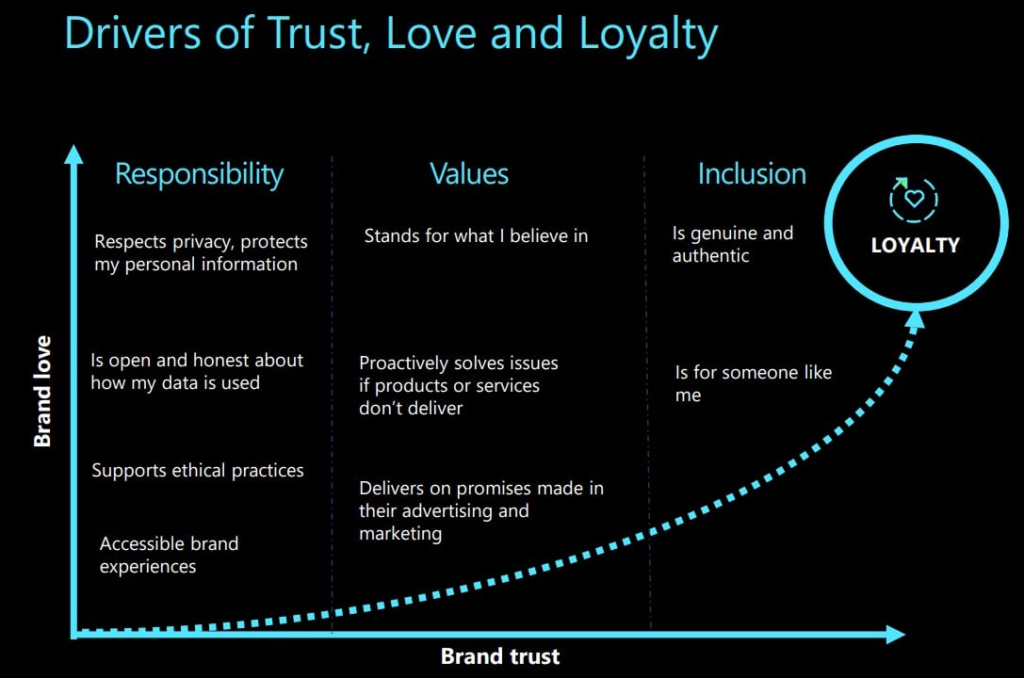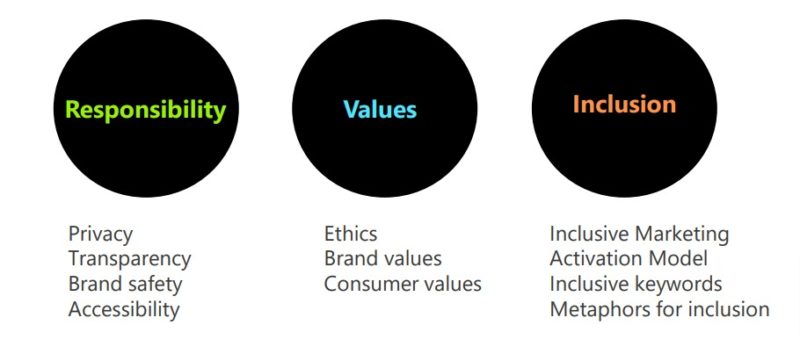Your entire marketing campaign – and indeed, brand – hinges on trust.
With pandemic pressures – and economic conditions in flux – it’s been a period of reflection for many. People are crying out for brands to lead – but also to reflect their values.
As we approach the new year, marketers who understand this shift are developing clear strategies to accelerate and distinguish their brands and marketing efforts.
There’s never been a time when your customers care more about the values and practices of your business than they do today.
But earning consumer trust is not easy. It takes time and effort on your part. But more so, it’s about upholding their values, as well as your brand values – and finding common ground.
So why is trust so important?
Well – according to Microsoft’s research – 85% of people will only buy from a brand they trust.
And a recent external Zeno Group survey found:
- 89% of Australian consumers are more likely to support a brand making a profit if they have a positive impact on the world
- 88% seek out brands with a strong purpose, while only 28% believe most brands have a strong purpose
- Australian consumers are 4 times more likely to purchase from purpose-driven brands
For example, the independent 2022 Futurebrand Index revealed sustainability has become a key driver of innovation: “Now, more than ever, our professional respondents are saying that it’s not enough for a company to say it has a meaningful purpose and will take action – it must be seen to fulfil its promises, to be fair and honest, to support the community, and to actively contribute to society.”
A brand must be purpose-driven, authentic, and resonate with its audience. Here’s how.
Creating relationships with people that lead to loyalty
It’s important for marketers to create strong relationships with people from the start, to build consumer loyalty.
Microsoft’s consumer research found three key focus areas as drivers of strong relationships: responsibility, values, and inclusion.
Marketers play a pivotal role in building trust within their brands, and through purpose-driven marketing strategies, and genuine, personalised experiences, they can effectively create strong relationships.
Microsoft found building relationships begins with responsibility, which becomes stronger through shared values and leads to loyalty through inclusion and authentic brand experiences.
Microsoft’s Marketing with Purpose Playbook (page 5) delves into these three focus areas, giving brands a variety of ways to improve their relationships.
Authenticity makes a difference
There is no real point in connecting with consumers if your business cannot follow through with its promises. This is where authenticity matters.
There are two main strategies that can help create a more authentic and genuine brand experience:
- Start with knowing your brand values and ensuring that what you do in marketing externally is also true internally. Ensure that your brand mission is woven throughout how you do business, including your advertising – because how you do business in today’s world is your marketing.
- Explore consumer value trends, then find the common values with your brand’s values and there you’ll discover genuine ways for your brand to connect with people with shared values.
But it’s not always a one-size-fits all approach.
How authenticity works across industries
In Travel, it’s about “experiences”.
Consumers want travel brands to go above and beyond, providing a personalised experience. They want the brand to understand and recognise how important they are as a person. Consider the person’s preference, what was their last experience like?
In Retail, it’s about “value”.
It comes down to providing a strong value exchange – do consumers believe the perceived value of the goods is equal to the price? Consumers want appropriate quality for the price they paid and unbeatable deals.
In Financial Services, it’s about a “strong customer experience”.
Providing peace of mind, hassle-free experiences, and exceptional customer service help build an authentic brand in this vertical.
In Autos, it’s about “accountability”.
Delivering on promises made in your advertising, along with proactive problem solving are key.
You can learn how to be more authentic in representing what people value in the “The role of Values” section of the Marketing with Purpose Playbook (pages 25-63).
Connecting it all together
Trust starts with putting people first by respecting their needs, such as their privacy through transparent policies, and secure data systems.
It then extends beyond responsibility to incorporate a brand’s values and beliefs.
Consumers want to see your brand take a stand, which is reflected through the decisions your business is making.
Next, a brand needs to be inclusive with design, marketing, and advertising.
These are not only foundational, but they are also fundamental.
And they are what consumers expect from you – the reward is greater brand love.
A continued love for the brand leads to repeat buys, and that is brand loyalty.
This infographic found in the Marketing with Purpose Playbook (page 6) explains how responsibility, values, and inclusion help a business grow consumer love and trust which in turn leads to brand loyalty that accelerates purchase consideration.

How attributes alert consumers to your values
From the video above, you learn there are four categories of business attributes available to advertisers on the Microsoft platform. These are: accessibility, environmental, inclusion, and community/social responsibility.
Below is an example of a text ad with the business attribute Women-owned, one of the attributes in the Community/Social responsibility category.
And choosing from these four categories help:
- demonstrate how your brand considers accessibility features in your business.
- connect with people through shared values.
- help people feel included. When someone experiences an inclusive ad, there was a 26% increase in purchase intent. Put simply, people will buy from brands that stand for something larger than just their product.
So you can see, while consumers are often simply viewed as ‘clicks’ and ‘impressions’, Microsoft Advertising has been working hard to personalise and humanise brands’ advertising strategies to truly connect them with their customers, building loyalty and trust through shared values and inclusive touchpoints.
Start marketing with purpose today
Here are some key tactics you can apply to activate inclusive campaign strategies and business practices to drive growth and purposeful advertising:

Get involved now
Marketers play a powerful role to build trust and business value with purpose-driven marketing. The overall key is authentic, genuine, and personalised experiences woven together through a strategy of Marketing with Purpose.
This article originally appeared in Mumbrella.














